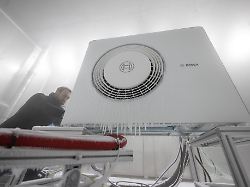The sale of the heat pump manufacturer Viessmann raises concerns about the state of the industry in Germany: competition from the USA is fierce, while cheaper and more efficient products from Asia are conquering the market. But some in the industry have not yet given up hope in Europe.
The heat pump market is booming. The numbers are doubling everywhere in a very short time: in production, in the number of heat pumps installed, in the share of the heating market. In the first quarter of this year alone, 91,000 pumps were installed – more than twice as many as in the previous quarter. And the heat transition is only just beginning. If Economics Minister Robert Habeck has his way, 500,000 heat pumps will be installed this year – and six million by the end of the decade.
First of all, these are ambitious goals. Kathrine von Graevenitz, economist and deputy head of environmental and climate economics at the Leibniz Center for European Economic Research and professor at the University of Mannheim, also assumes that demand will increase. It is normal for new technologies to take time before consumers get involved. “There are people who are adventurous and optimistic and jump on the train first,” she says in an interview with ntv.de. “That leads to learning effects and more and more people follow suit.”
However, it is unclear who will benefit from this booming market. After the sale of the second largest German heat pump manufacturer, Viessmann, to the US company Carrier Global, it was feared that German heat pump manufacturers would no longer be competitive on the world market. “The Viessmann case shows how Robert Habeck’s hasty and complicated heating transition can have a negative impact on the German economy,” said FDP General Secretary Bijan Djir-Sarai to the “Handelsblatt”.
Enpal and Rheinmetall get involved
But not everyone looks so hopelessly at the German heat pump manufacturers. Enpal, a company that is actually active in the photovoltaic industry, is now entering the heat pump business – with a German heavyweight. In the future, heat pumps from Bosch will be sold together with the PV systems from Enpal. “The idea behind it is to be able to offer a complete package,” says Wolfgang Gründinger, energy expert at Enpal, in an interview with ntv.de. “Because the heat pump really makes itself felt when it comes to heating costs in combination with solar energy.”
Other German companies are also taking advantage of the huge market that is currently opening up. The German heating engineer Vaillant is massively expanding its production – and building a factory for heat pumps in the Slovakian district of Senica.
Even a DAX corporation that is actually known for something completely different is looking around at the heat pump market. Rheinmetall recently announced that it would be producing compressors for heat pumps in the future. The component is the heart of the heat pump – whether it works well determines whether the heat pump heats efficiently. The Düsseldorf company has already received the first order worth 770 million euros – according to “Handelsblatt” information from Viessmann.
Pressure from Asia
But at the same time, the pressure from Asia is also having an impact on the German market. This is shown above all by the sale of Viessmann: According to Handelsblatt information, the tough competition from Asian manufacturers is said to have been an important reason for the sale.
According to the International Energy Agency (IEA), a third of all heat pumps were manufactured in China in 2020. With such large quantities, companies can produce faster, cheaper and more efficiently – for the small German manufacturers it is then hardly possible to keep up.
“Politics must help ensure that these economies of scale can also occur in Europe in the next five to ten years,” says Gründinger from Enpal. Such support is not only necessary because of the competitive pressure from Asia. US President Joe Biden’s Inflation Reduction Act will release billions in subsidies for green technologies – incentives that must also be set in Germany and Europe, according to Gründinger.
“public heat pump”
Despite the cooperation with a German manufacturer, the pressure from Asia does not go unnoticed by Enpal. “It makes no sense to limit yourself to one supplier from one country,” says Gründinger. The start-up also sells the products of the Japanese heat pump manufacturer Daikin – and thus also benefits from the competition from Asia.
But Gründinger sees other advantages in working with the Japanese manufacturer than just the low unit prices. Because just like Bosch, Daikin offers something that is almost priceless: the companies also offer craftsmen to install and maintain the heat pumps. “The craftsmen’s network is worth a lot,” says Gründinger. After all, a heating system is worth nothing without installers and craftsmen who can carry out regular maintenance work.
